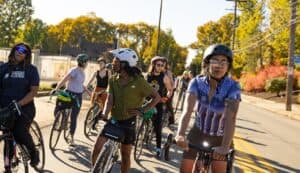Mobility Justice is at the heart of our Mission and we’re committed to continuously listening, learning and growing.
The BikePGH staff and board are committed to becoming an anti-racist organization. We aim to educate and inform ourselves and supporters, listen to the experiences of marginalized communities locally and nationally, and work collaboratively with experts and advocates to address transportation inequities in Pittsburgh.

What is Mobility Justice?
Terms like Mobility Justice, Transportation Justice, and others have been used to describe the affordability, safety, and accessibility of transportation options in a community. And most importantly, mobility justice looks at who does not have access to safe, affordable, and convenient transportation – and why.
In short, Mobility Justice, is a concept rooted in social justice, aiming to create a world where people feel safe existing on the streets and can experience the full joy of movement regardless of their race, religion, background, or physical ability. Mobility justice goes beyond transportation systems and infrastructure, addressing issues such as racism, gender-based violence, and harassment in transportation planning, policy, and advocacy. It also encompasses the liberation of marginalized communities and the acknowledgment of power and systemic inequity in relation to how people move through and experience public spaces.
What does this have to do with biking and walking in Pittsburgh?
Mobility justice is at the core of our mission. When we transform streets to make biking and walking commonplace for all Pittsburghers, they improve the quality of life and reduce the harmful effects of car dependency. 25% of Pittsburgh households do not have access to a car, and we must ensure that those households have safe, affordable, and convenient transportation options.
We believe that Pittsburgh must examine our shared history of systematic inequalities, including those based on race, ability, gender identity, economic class, and geography, and how those inequities impact access to transportation options. Through examination, active listening, and advocating for policy reform, we can start to reshape our streets and who has safe access to them.
It is our duty to recognize and reconcile the historical and current injustices in mobility, the role we have played, and how we can do better as an organization.
What is the Mobility Justice Learning Series and who is it for?
Since we, as an organization, intend to expand our knowledge and understanding of the inequities that exist in transportation, we thought we’d bring our supporters along with us. Our Mobility Justice Learning Series is for anyone who wants to actively listen to and learn from the lived experiences of marginalized people in Pittsburgh and hear from experts in fields, directly and indirectly, related to transportation. Through listening and intentionally soliciting feedback, BikePGH can further identify the areas that our work has fallen short.
HERE’S OUR PLAN FOR WHAT WE HOPE TO LEARN AND SHARE WITH OUR SUPPORTERS
- Produce blogs that address topics, directly and indirectly, related to mobility justice intending to expand our knowledge and yours.
- Hire local and national experts to share their knowledge and experience with our staff, members, and supporters.
- Create free visual content to explain why mobility justice is essential in Pittsburgh, why we are committed to it, and why it’s important for our supporters to be committed to it.
- Uplift and amplify the valuable experiences and work that has already been done by sharing information with you, our audience!
- Uplift and amplify the voices and stories of those in Pittsburgh who don’t have access to safe, affordable, convenient transportation options.
- Further our understanding of the transportation inequities that exist in Pittsburgh and the harm those inequities have inflicted on communities.
- Gather feedback from Pittsburghers who are experiencing those inequities and what they need to thrive in their neighborhoods.
- Seek knowledge and expertise from local and national advocates doing the work of ensuring transportation policies and projects are serving communities.
- Share how access to transportation affects every aspect of our lives including food access, affordable housing, employment, health care options, and more.
- Provide insight into how to be part of the advancing mobility justice in our communities.
- Through our grassroots advocacy initiatives, promote and support policies and investments that result in better outcomes for marginalized Pittsburghers.
We encourage you to share with us the topics and issues we’re missing that we should focus on in this series. We invite you to join us in this learning series and be a part of a movement for a more equitable transportation system in Pittsburgh.